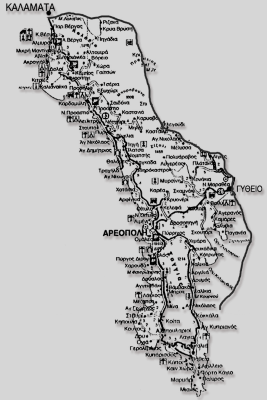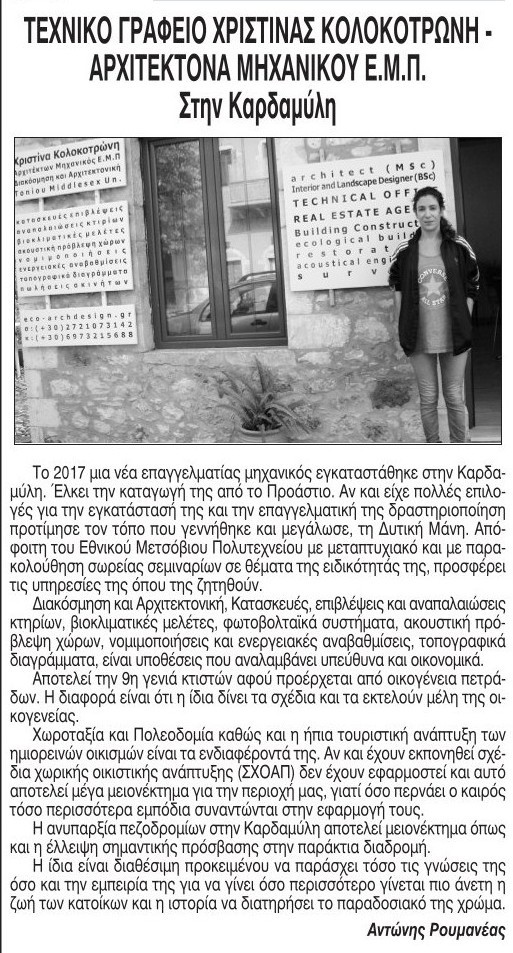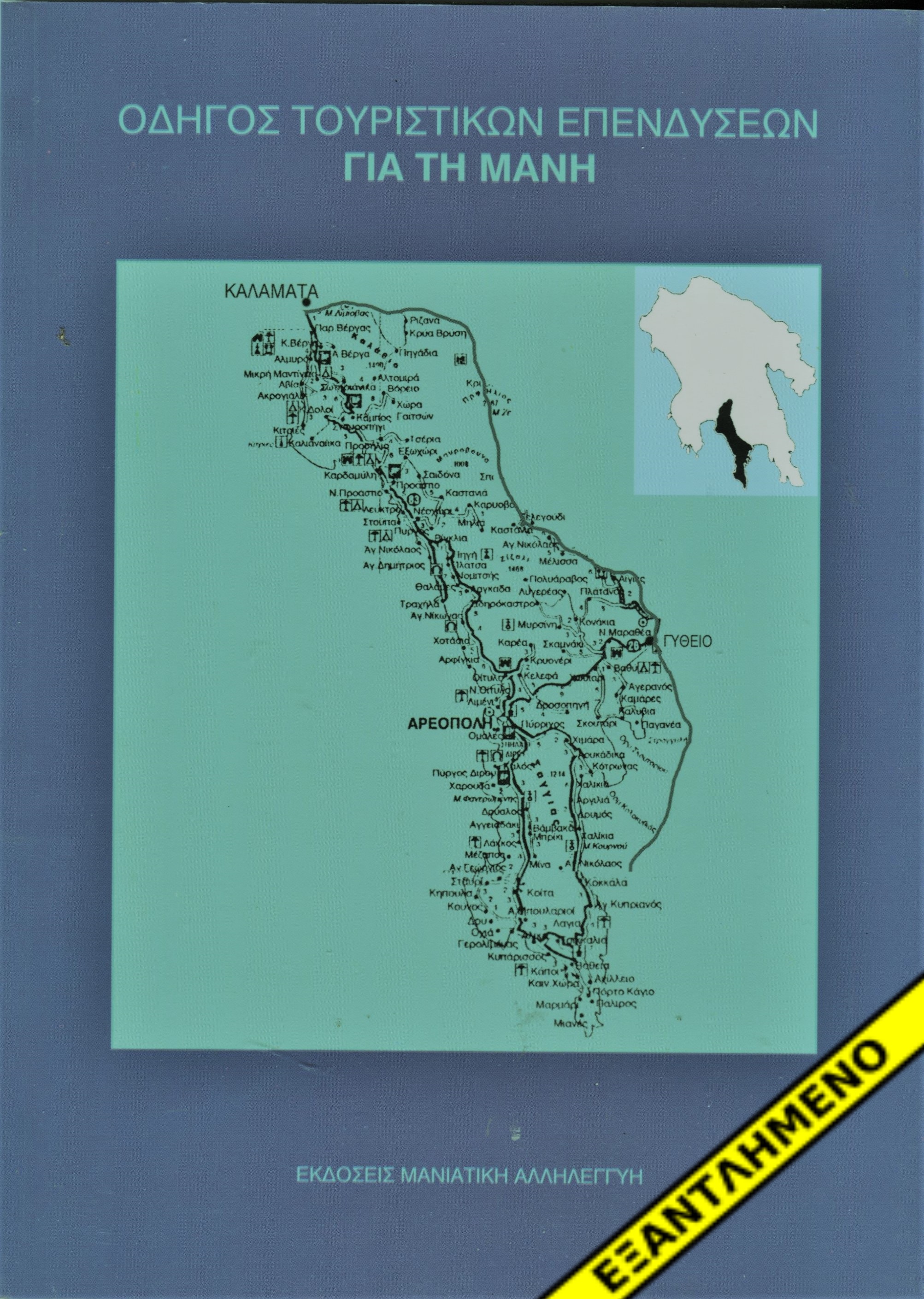ΑΠΟ ΜΗΝΑ ΣΕ ΜΗΝΑ
- ΦΕΒΡΟΥΑΡΙΟΣ 2026Επιδόματα από το δήμο Δυτικής Μάνης σε αναπληρωτές εκπαιδευτικούς και αγροτικούς γιατρούς της περιοχής Με ομόφωνη απόφαση του Δημοτικού Συμβουλίου, ο δήμος Δυτικής Μάνης προχώρησε στη λήψη μιας ουσιαστικής πρωτοβουλίας, αναγνωρίζοντας την ανάγκη στελέχωσης των σχολικών … Συνέχεια ανάγνωσης ΦΕΒΡΟΥΑΡΙΟΣ 2026
- ΙΑΝΟΥΑΡΙΟΣ 2026Βροχοπτώσεις και κατολισθήσεις στη Λακωνία: Χείμαρροι οι δρόμοι στον Πλάτανο που ήταν εντονότερα τα φαινόμενα Έντονα καιρικά φαινόμενα έπληξαν στις 4 Δεκεμβρίου περιοχές του δήμου Ανατολικής Μάνης προκαλώντας σοβαρά προβλήματα στο οδικό δίκτυο. Στον Πλάτανο του … Συνέχεια ανάγνωσης ΙΑΝΟΥΑΡΙΟΣ 2026
- ΔΕΚΕΜΒΡΙΟΣ 2025Πετυχημένη και η φετινή, 20η , γιορτή Κάστανου στην Άρνα Την Παρασκευή 24 Οκτωβρίου πραγματοποιήθηκε η τελετή έναρξης των τριήμερων εορταστικών εκδηλώσεων της 20ης γιορτής Κάστανου στην Άρνα, που διοργάνωσε η Τοπική Κοινότητα Άρνας και ο … Συνέχεια ανάγνωσης ΔΕΚΕΜΒΡΙΟΣ 2025
- ΝΟΕΜΒΡΙΟΣ 2025Μανιάτης ο νέος Μητροπολίτης Κονίτσης, ο Επίσκοπος Σταυροπηγίου Αλέξιος (Ψωίνος) από την Αρεόπολη Ο νέος Μητροπολίτης Κονίτσης κ. Αλέξιος, γεννήθηκε το 1963 στην Αρεόπολη Λακωνίας. Φοίτησε στην Ανωτέρα Εκκλησιαστική Σχολή Αθηνών και ακολούθως σπούδασε θεολογία στη … Συνέχεια ανάγνωσης ΝΟΕΜΒΡΙΟΣ 2025
- ΟΚΤΩΒΡΙΟΣ 2025Νέος διαγωνισμός 13,7 εκατ. ευρώ για την κτιριακή αποκατάσταση των Σπηλαίων Διρού Νέο διαγωνισμό διενέργησε για λογαριασμό της Εταιρίας Ακινήτων του Δημοσίου (ΕΤΑΔ) η Μονάδα Συμβάσεων Στρατηγικής Σημασίας του Υπερταμείου (ΤΑΙΠΕΔ). Οι συμμετοχές στο διαγωνισμό υποβάλλονταν … Συνέχεια ανάγνωσης ΟΚΤΩΒΡΙΟΣ 2025
MAIN ARTICLE IN ENGLISH
- WHERE AND HOW WILL THE BICENTENNIAL OF THE MANIOT VICTORIES OF 1826 BE CELEBRATED?
This year marks 200 years since the three victorious battles – at Verga, at Diros, and at Polyaravos – fought by Maniot forces against the Turco-Egyptian troops, when they attempted to invade Mani from three different directions and conquer it. The heroic resistance of our ancestors, organised into combat groups, but also including hastily armed elderly men and women, prevented these invasions into Mani and overturned the intentions of Ibrahim Pasha of Egypt for the complete occupation of the Peloponnese and permanent dominance over its land, as had been agreed with the Turkish Sultan. Given that bicentenaries of major historical events constitute anniversaries of a special character, and are therefore celebrated with grandeur throughout the world, the question arises: how do the authorities in charge (the state administration, the regional administration and the local government) intend to organise the 200th anniversary of the Maniot Victory Battles of 1826 and, above all: what specific weight do the two municipalities (δήμοι) of Mani —which represent the only organised collective expressions of the Maniοt region during the modern era— give to this bicentennial in their priorities? Will this special commemoration once again be an opportunity for routine public events, or will it become an opportunity for reflection and a strong push regarding those substantive actions that we should have implemented, so that those battlefield epics of our ancestors might serve as a constant point of departure for reconsideration and as a continuous transmission of a timeless message to all, about how freedom is safeguarded?
We, the non-profit association MANIOT SOLIDARITY and the monthly newspaper it publishes, within our limited means, have started actions very early, since the summer of 2025, with the aim of raising awareness among the authorities in charge, starting with the most neglected anniversary, that of the Battle of Polyaravos, which for many years has been celebrated far from the site of the battle, on the opposite hill and at the small chapel of Panagia, while the parish church of the settlement is in danger of collapse! (The letters we sent to the MPs of Laconia, to the Mayor of East Mani, and to the Bishop of Mani are posted on our website www.maniatiki.gr, in a special folder entitled: 200 YEARS SINCE THE MANIOT VICTORIES OF 1826. In the same folder we will also include any further awareness-raising actions we undertake). However, it is not only necessary to highlight the site of the Battle of Polyaravos, through a) the opening of a road to the settlement where the three-day battle was fought, b) the repair of its parish church, and c) the upgrading of the celebration of Polyaravos battle to one of regional character; it is also necessary to carry out projects to highlight the sites of the corresponding battles at Diros and Verga.
On the seashore of Diros, at the site of the decisive battle, a magnificent monument was erected 20 years ago, created following a donation by the Mitsakos merchant family and materialised under the care of Professor Grigoris Skalkeas. The placement of the monument signifies an obligation to transfer the festive events from the square of Pyrgos to the seashore beyond the Diros Caves, following the preparation of a suitable area. An important step in this direction has been taken with the establishment of a “performance” reenacting the Battle of Diros against the landing forces of Ibrahim, which was established a few years ago and takes place on the afternoon of the eve of each anniversary. But this is only a first step toward transferring the site of the main festive events to the area where the main battle took place.
Anyone who participates in the annual commemorative events for the Battle of Verga feels uncomfortable due to the disproportion between the height of the statue of the Maniot warrior and the narrowness of the space it overshadows. We made an earlier proposal to the then Mayor of Kalamata to widen the space where the events are held, at least through the preparation of a small technical study and the implementation of a minor technical project to cover the neighbouring small stream and thus expand the area for the festive events. It was received positively, but did not proceed to implementation. Characteristic, moreover, is the fact that, in order for the urban planning study of the settlement of Verga (promoted by the Municipality of Kalamata for 30 years now) to be completed, the Council of State (Συμβούλιο της Επικρατείας), during the preparation phase of the relevant Presidential Decree, recently made an observation that the Wall of Verga, from which the armed Maniots confronted the Egyptian cavalry, should first be registered as an archaeological site with a Protection Zone. The implementation of this order of the Supreme Court, by the archaeological service of the Prefecture (Αρχαιολογική Υπηρεσία Μεσσηνίας) and the Municipality of Kalamata (Δήμος Καλαμάτας), could make this monument accessible to the general public, as over time it has become inaccessible.
The historian Dikaios Vagiakakos, within the framework of a major pan-Maniot cultural event two decades ago, had submitted a proposal to establish events under the title “Victories” (Νικητήρια), which would include annual Pan-Maniot celebrations, held in rotation at each of these battlefields, combined with an annual athletic running race to and from the three battlefields (Verga, Diros, Polyaravos).
We, as a minimum debt of honour to those who played the leading roles, with the limited means at our disposal, will undertake and continue to promote during the coming period actions to raise awareness among the numerous and dispersed Maniot community, so that the bicentenary of the Maniot epics of 1826 may lead both to an upgrading of the celebration sites and substantiation of the events, with the aim of extending their historical memory over time.
THE EDITORIAL BOARD








